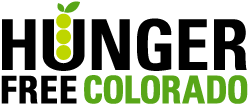Immigrant families often face unique barriers to accessing the nutrition programs that can help them thrive. These barriers include harmful policies that exclude some immigrant populations from programs, misinformation about the repercussions of accessing resources, and a lack of language access and culturally appropriate food. At the same time, COVID-19 and a range of attacks on immigrant families (including the public charge rule) increase the need for these community-based food resources.
Strengthening Food Security in Immigrant Communities Gathering
In May 2020, Hunger Free Colorado hosted the Strengthening Food Security in Immigrant Communities Gathering (The Gathering). From across the state, attendees included community members, advocates, and leaders. The goal of The Gathering was to shape action to address barriers to participation in nutrition programs.
We have compiled the recommendations identified through The Gathering and a bilingual survey of community leaders into a report.The Strengthening Food Security in Immigrant Communities report focuses on:
- Program changes
- Outreach strategies
This report covers the National School Lunch Program (NSLP), summer meals, food pantries and the Special Supplemental Nutrition Program for Women, Infants, and Children (WIC). Each section details how to improve access in immigrant communities.
Impact of the Public Charge Rule on Nutrition Programs
The public charge rule threatens to deny visa and legal permanent residency (green card) applications to immigrants who use certain public benefits. This deters people from accessing a host of resources, including nutrition programs, and further isolates immigrant communities. This harmful chilling effect has impacts well beyond the immigrant populations and programs it actually applies to. None of the programs discussed in this report are considered under the new public charge rule.
National School Lunch Program (NSLP)
The following are suggestions to improve immigrant participation in the National School Lunch Program (NSLP).
- Expanding Coverage
Assist the entire family, not just school-aged children. While advocates and programs may not have the authority to expand this program, local school meal sites can build relationships with and connect families to additional community-based food resources.
- Data
More transparency on how personal information is used. Households worry that the NSLP will share their information with other agencies, particularly with immigration enforcement. This fear likely drives people away from this program.
- Outreach
Create messaging to remind people that this program is safe and improves child health and wellbeing. Culturally relevant and appropriate messaging is also suggested.
Summer Meals
The following are suggestions to improve immigrant participation in summer meals.
- Raise Awareness
Spread the word about the program and its benefits by sharing more information on when, where, and how to access summer meal sites.
- Collaborate
Work with other community organizations to coordinate food pick-up and other summer activities.
- Revamp the Menu
Create kid-friendly and culturally relevant meals.
- COVID-19 Safety
Educate families on what safety protocols are in place to prevent the spread of COVID-19. Share information on how they can stay safe while receiving summer meals.
Food Pantries
The following are suggestions to improve immigrant participation in food pantries.
- Alleviate Fears
Create messaging to tell communities that personal information is not shared with immigration enforcement and that food pantries are a safe place to access food resources.
- Create Systems
Update websites or apps so community members know what food is in stock at local pantries.
- Build Relationships
Work with trusted community leaders and organizations to share ideas and create services that best fit the needs of Colorado immigrant communities.
Special Supplemental Nutrition Program for Women, Infants, and Children (WIC)
The following are suggestions to improve the Special Supplemental Nutrition Program for Women, Infants, and Children (WIC).
- Public Charge
Share clear messaging that public charge does not apply to WIC.
- COVID-19 Flexibilities
The ability to complete enrollment and clinic visits remotely during the pandemic is a welcome change that community members support on a long-term basis. Hunger Free Colorado suggests that WIC permanently adopt these flexibilities.
- Products
Expand the range of products considered WIC-eligible and clearly mark these items in stores to improve the WIC shopping experience.
While specific recommendations vary from program to program, community leaders consistently highlighted the need to take deliberate steps to welcome immigrant communities into food programs.
To access the full report, click here.

